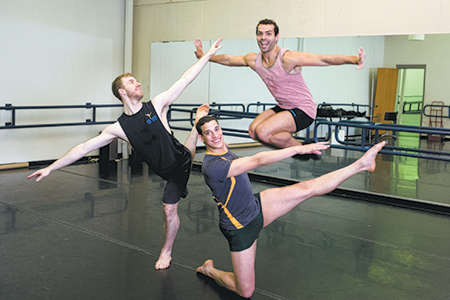Subscriber Benefit
As a subscriber you can listen to articles at work, in the car, or while you work out. Subscribe NowDance Kaleidoscope’s latest offering, “Divos” (through April 8 at Indiana Repertory Theatre), celebrates the men in the company both as dancers and as choreographers. On stage, they speak with physicality. Here, a trio of DK leading men goes verbal.
Timothy June, 31
 Seasons with DK: 10
Seasons with DK: 10
Starting point: Wanting to improve his dance steps for high school musical theater in Enfield, Connecticut, June began training at the New England Dance Conservatory, where he “realized how far behind I was. So I enrolled in a lot of classes—five or six days a week. I backed away from musical theater, quit the track team, and focused on dance.”
Going pro: “New York and Chicago auditions are cattle calls,” June said. “You’re one of 400 dancers. Sometimes you’ll get 10 minutes in and they’ll say, ‘That’s enough.’ Other times, you’ll get through a three-hour audition and they’ll say, ‘Thank you,’ and that’s it. It was different in Indy. DK is a company audition. You are thrown in with the company to see if you can keep up.”
Lessons learned: Early on, June said, he misunderstood what it meant to be a good dancer on stage. “It’s taken me a long time to realize what I appreciate about dancers when I watch them. It never has to do with technique. It’s their characterization. Their lyricism. That’s what I lacked. I was just doing steps because I wanted to be the best at that step. It was probably the most boring thing to watch because I had no characterization behind it. Now I don’t care … well, I do, but it’s the least of my worries.”
Brandon Comer, 27
Seasons with DK: 9
 Starting point: “I used to flip off of the jungle gym and my mom got scared,” Comer said. “So she signed me up for gymnastics.” He then transitioned to a dance program there. “At school, it was a little rough with the bullying. It got real sometimes. Especially in middle school. So I started doing more sports and track. But then, once high school hit, I joined show choir [at Center Grove] and that was it. That’s when I realized I love performing. I didn’t care what anybody thought.”
Starting point: “I used to flip off of the jungle gym and my mom got scared,” Comer said. “So she signed me up for gymnastics.” He then transitioned to a dance program there. “At school, it was a little rough with the bullying. It got real sometimes. Especially in middle school. So I started doing more sports and track. But then, once high school hit, I joined show choir [at Center Grove] and that was it. That’s when I realized I love performing. I didn’t care what anybody thought.”
Going pro: Comer considered Ivy Tech or IUPUI while taking classes with DK, but was offered a one-shot job by DK Artistic Director David Hochoy that led to an apprentice position offer. “I thought, ‘Well, the opportunity is here.’” Comer soon became a full company member.
Onstage persona: “I’m joyous. Even if it’s a serious piece, I have a sense of joy. … One of my teachers said, ‘Whoever is on stage with you, whoever is in the audience, be yourself on stage.’”
On performance life span: “Dancing is so hard on our joints. The average age is 35-40 to end a dancing career. But you can go on and do Broadway. You can still dance.”
Stuart Coleman, 26
 Seasons with DK: 4
Seasons with DK: 4
Starting point: Coleman received dance lessons as a Christmas present in sixth grade so he would have an upper hand at auditioning for high school shows. For the Lynchburg, Virginia, native, that evolved into interest in ballet and modern dance. Was it difficult being one of the only boys in class? “Easier, if I’m going to be real here,” he said. “Later, I realized I had been given the easy route all those years. But it was nice because it gave me a sense of what these leading roles could feel like. But I had to go back to the beginning to get there.”
Indy vs. New York: Coleman had his heart set on Fordham University in the Bronx, but a visit to Butler to audition won him over. “Many people who go to schools in these big dance hubs—Chicago, L.A., New York—don’t finish. Surrounded by so many opportunities you think, ‘Why am I spending money on college?’ Here, the students are more motivated to finish their degrees.”
Breaking in: After learning that a DK dancer was leaving before the end of the season, Coleman quickly shot an email offering to fill in. It got him an audition but not the gig. However, it put Coleman on the radar, which eventually led to an offer. “I started three days before I walked graduation at Butler.”
The push: “You have to be your own policeman,” he said. “You have to keep asking yourself, ‘Am I working safely? Am I working to my highest caliber of excellence?’ And you have to find a balance.”•
Please enable JavaScript to view this content.

